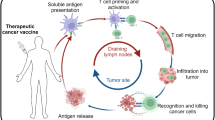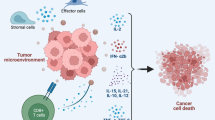Abstract
Cytotoxic T-cell responses to shared tumor antigens have been characterized for several tumor types, and the MHC-associated peptides that comprise these antigens have been defined at a molecular level. These provide new tools to determine whether immune responses can be generated with these tumor antigens, and there are data to suggest that such immune responses can be generated. However, it is also clear that tumor cells can evade immune responses directed against some shared antigens, by downregulating expression of MHC or of the antigenic protein(s), as well as by more active methods such as secretion of immunosuppressive cytokines. Awareness of these mechanisms of immune escape will help to direct development of the next generation of tumor vaccines. Targeting unique antigens and modulating the cytokine environment likely will be critical to comprehensive vaccine systems in the future.
Similar content being viewed by others
Author information
Authors and Affiliations
Additional information
Received: 20 March 1999 / Accepted: 3 May 1999
Rights and permissions
About this article
Cite this article
Slingluff, C. Targeting unique tumor antigens and modulating the cytokine environment may improve immunotherapy for tumors with immune escape mechanisms. Cancer Immunol Immunother 48, 371–373 (1999). https://doi.org/10.1007/s002620050588
Issue Date:
DOI: https://doi.org/10.1007/s002620050588




